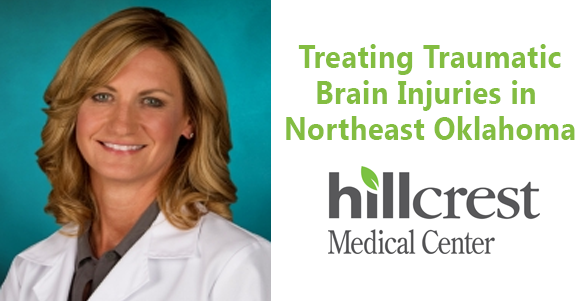
The Kaiser Rehabilitation Center at Hillcrest Medical Center has served northeast Oklahoma for more than 40 years. The highly specialized occupational, physical and speech therapy staff at the Kaiser Rehabilitation Center understand the needs of patients with neurological conditions and provide individualized treatment plans and one-on-one therapy to help patients regain mobility and independence.
Dr. Perri Craven, medical director of Kaiser Rehabilitation Center, shares some insight into the neurological rehabilitation program at Kaiser, rehabilitation for patients with traumatic brain injuries, and her passion for treating and keeping traumatic brain injury patients close to home for treatment.
The vast majority of brain injury patients can be divided into two categories. The first, younger people who have been involved in motor vehicle accidents that have resulted in traumatic brain injuries. The second, the elderly, who may suffer from diabetes or cataracts and fall and hit their head. Craven notes that if they are on blood thinners, that can become especially dangerous.
With the portrayal of brain injuries in Hollywood movies, Craven says that many families come in with the misconception that the patient will go to sleep and then wake up and resume their life. In reality, some patients may not be able to drive or return to work.
Craven adds that there are so many ramifications after a brain injury that it’s hard to be certain what to expect. Sometimes staff needs to reset the family’s expectations.
“A lot of people have great outcomes and great recovery, but to me, the clock starts on day one of rehab,” says Craven. “This is a marathon we’re running together, and it’s a long process with many ripple effects to family members.”
“I like to get the brain injuries into rehab as soon as possible. Most brain injuries are here for around three to four weeks and at the end of that time, we’re usually able to transition them to home living.”
Craven is a firm believer that patients get better in their home environments. With familiar family members, friends, smells and foods, she believes patients get better being somewhere they are comfortable and familiar with.
Once a patient is ready to transition home, they enter the neuro day treatment program, which is the only program in northeast Oklahoma for young people with brain injuries. Staff help patients return to work and day-to-day life with job, life and, if needed, college skills.
“You get about four hours of therapy a day with the counseling services – physical, occupational and speech therapies. It’s a highly integrated program to help get their life and job skills back.”
Kaiser staff will maximize the use of the Hillcrest Medical Center campus for their neuro rehab patients.
“If a patient is able to go back to work, our therapist works with the patient’s employer to make sure they can do their job safely,” says Craven. “We’ll work with their employers on bringing them to work part time and do therapy part time. Sometimes, we’ll have them go to the gift shop, do route finding throughout the hospital, we may have them make deliveries. We have a car in a garage that we work on car transfers if they’re mechanics. We’ve even had patients go out and change tires.”
Kaiser staff implement creative ways of giving patients the best care. That includes therapy dogs, music therapy and time spent outdoors.
“We allow dogs here in rehab because if you’re a dog lover and are missing your dog, the best smiles we’ve had are patients who won’t even interact and then we bring a therapy dog up here and they immediately start petting the dog,” Craven says. “Those kinds of things are intangible; you can’t bottle them up but they help.”
Craven is passionate about brain injury. She is the only physician in Tulsa who is board certified in the sub-specialty of brain injuries and has devoted her entire life to taking care of them.
“The best thing is when you see a patient go home or walk or talk,” Craven says. “I tend to be very giving with my patients, a lot of our rehab patients will update me on their progress. I see them in our neuro day treatment program and that’s just what keeps me going at the end of the day.”
To learn more about Kaiser Rehabilitation, please call 918-579-7100.
